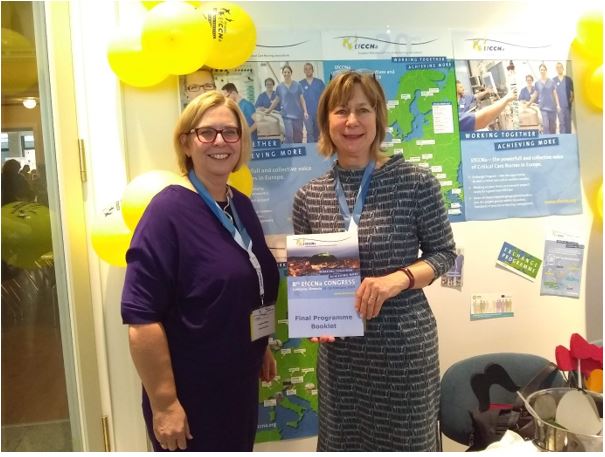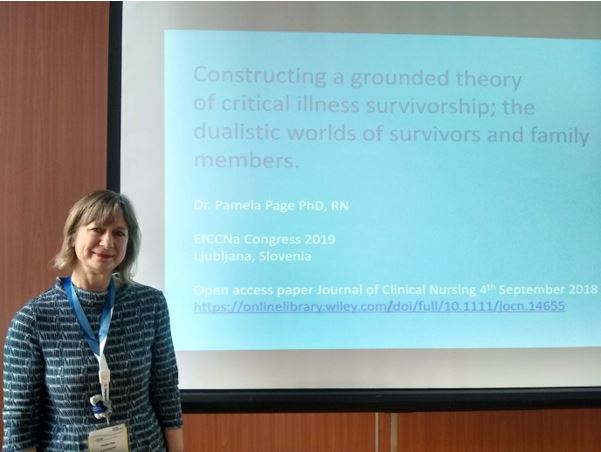EFFCNA report by Pamela Page
10th May 2019
European federation Critical Care Nurses association (EfCCNa) 2019
I was delighted to be able to attend the 8th EfCCNa congress, Ljubjana, Slovenia in February with the support of a grant from BACCN. It was the first time I had attended EfCCNa having been a regular attender at BACCN conferences in the UK, and a member since the early 1990s. There were over 400 delegates from all around the world, with abstracts received from over 48 countries. The theme of the conference was “working together, achieving more” and celebrated the 20th anniversary of the inaugural EfCCNa meeting, with some of the founding members such as John Albarran. John also opened the conference with a keynote entitled “Family Involvement in ICU-where are we know?” He provided an incisive overview of the journey we have been on, and the work that still needs to be done, to achieve partnership that truly espouses family centred care within critical care. This is an area that resonates strongly with me as one of the BACCN members that worked on the visiting guidelines published by BACCN back in 2012.
It was fascinating hearing the variation in critical care nursing across Europe (and beyond), and yet there was a common bond that bound us in terms of seeking the best care for patients and families who have to experience critical illness. There were debates around physical and chemical restraint, managing delirium and agitation. Psychological aspects of care was a strong theme through the conference and it was in this category that I presented part of my doctoral research around critical illness survivorship, the full paper is open access at: https://onlinelibrary.wiley.com/doi/full/10.1111/jocn.14655
Professor Leanne Atkin, City, University of London, provided a succinct overview of the current research in the area of psychological support and went on to report on the PRINCIPLE study that look at the effects of a diary and or lay summary intervention as an alternative to usual care, to reduce psychological sequalae post critical illness.
Professor Leanne Aitken, critical care professor with Dr Pamela Page at the EfCCNa stand in Ljubljana
David Waters a long standing BACCN board member delivered a powerful paper on the issue of drug errors entitled “Second victim in the ICU – supporting error makers”. Detailing the consequence for error makes and the support required to help them come to terms with their actions. He also facilitated a ventilation workshop on loops and waveforms.
As always, one of the most powerful presentations came from an individual who had experienced critical care as a patient, he provided an insightful account of the highs and lows of his journey following cardiac surgery. He highlighted the isolation he experienced in a single room and how he valued the close relationship with the ICU nurses during his stay in critical care. He did not advocate the “convenience” of leaving a CVP line in for more than 14 days, with a consequential infection!! The overriding negative experience for him was the lack of pain control in critical care, and how nobody can get better when they are in pain.
Other presenters familiar to the BACCN community were Professor Natalie Pattison who discussed a feasibility study around massage and aromatherapy. Geraldine O’Gara (Royal Marsden, London) gave a powerful presentation of “The needs of the families of patients with a chronic illness who are in the Critical Care Unit”, resulting in an identified toolkit of support.
There were many other excellent presentations - the organising committee and EfCCNa President Professor Bronagh Blackwood from Queens University NI should be congratulated on an excellent conference. I am very grateful for the support of the BACCN to attend and present at EfCCNa congress 2019.
Dr Pamela Page presenting her paper on survivorship post critical illness.






